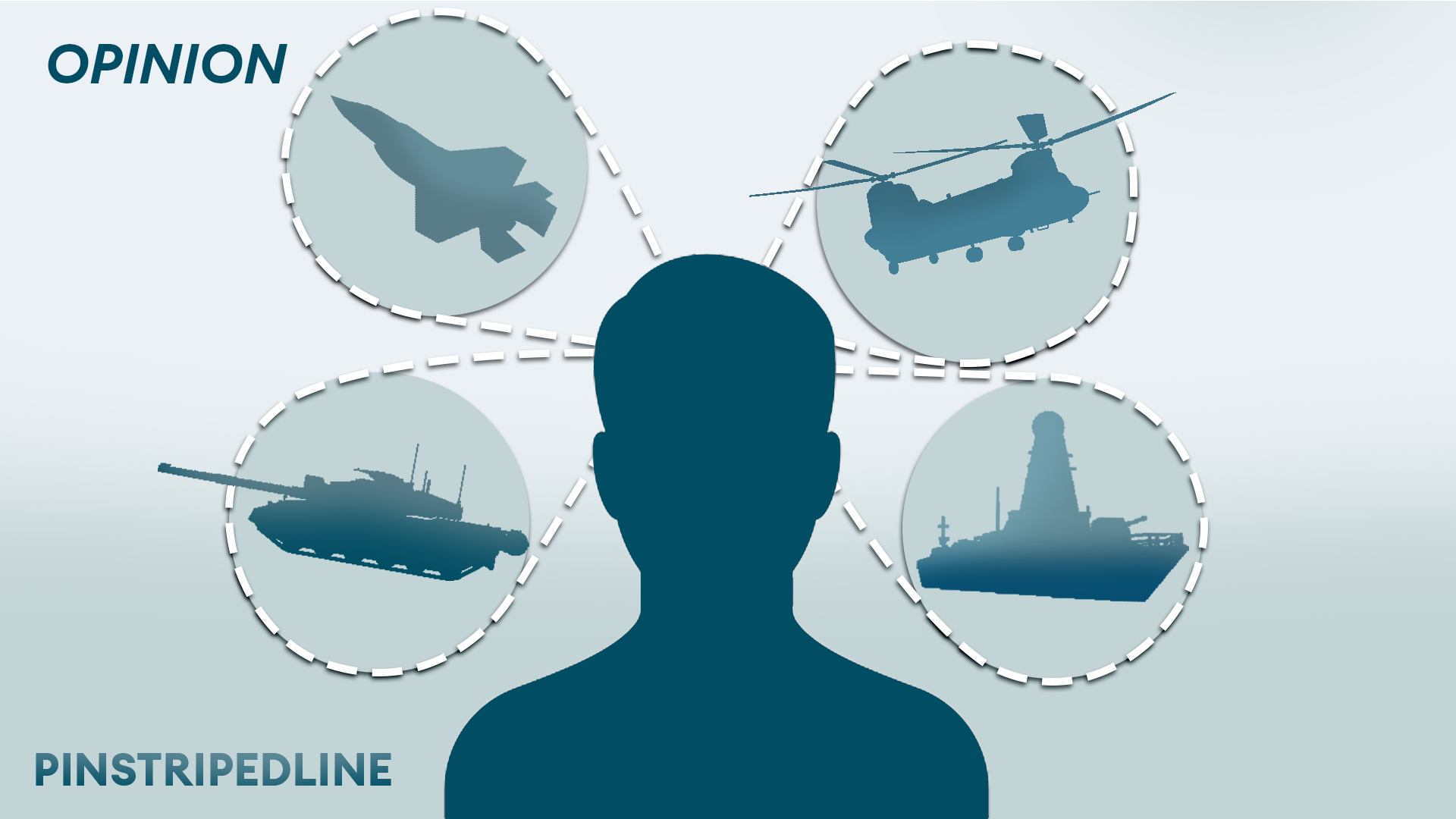
Tough defence decisions face new Government needing more cash than MOD budget

There are difficult decisions to make for the new Government, made even harder by the wider challenges of retaining service personnel. Defence and security blogger @PinstripedLine examines the British security challenges facing Sir Keir Starmer's Government.
Following the 2024 General Election, ministers have arrived in office and begun to set out their plans for Government.
Prime Minister Sir Keir Starmer has travelled to Washington DC to attend the Nato summit, bringing together the alliance's leaders and marking an opportunity to set out his Government's vision for defence and security policy over the next five years.
Likely, he will also reconfirm plans made as a manifesto commitment to launch a strategic defence review within the next few months and reaffirm the size and scale of British commitment to Nato, both politically and militarily.
- Army becoming UK's 'most Nato' service, but next steps could be a balancing act
- Who is in so far at the Ministry of Defence following Labour's election win
- Starmer still not giving timeline when UK will spend 2.5% of GDP on defence
More widely, the new Secretary of State for Defence, John Healey, in his first weekend in office, visited Ukraine to send a signal of ongoing British support.
Announcing additional resources for the Ukrainian military, including additional Brimstone missiles and AS90 howitzers from British Army stocks, a clear message was sent to Russia that even though the Government has changed, British support for Ukraine has not altered.
But even if this won't change, what are the likely policy challenges coming up in the strategic defence review?
Since 2010, British policy has been to carry out strategic defence reviews every five years, and one was due in 2025 regardless of who won the election.
This review will have to address some very substantial policy questions around where to prioritise and invest, versus stepping back or cutting capabilities.
The core question facing the review team will be where do the UK's security priorities lie, and what combination of military, intelligence, diplomatic and other Government capabilities are needed to meet this?
Logic would suggest that the UK's priorities lie with Nato and European security, but how is this balanced with wider international security interests?
For decades, the UK has sought to balance off commitments to Nato and European security with a desire to play a wider global role ranging from disaster relief in the West Indies to warfighting in Iraq and Afghanistan.
The result of this policy has led to the UK maintaining broadly capable Armed Forces, able to deploy globally in varying numbers, either to operate independently or as part of an international force.
The result is that today the UK participates in operations and maintains a truly global defence footprint, with troops, aircraft and ships operating permanently out of every continent.
In the reviews held since 2010 the UK had focused on trying to maintain broadly balanced Armed Forces, capable of global deployment rather than being focused too heavily on Nato or other institutions.
For the next review, given the rapidly changing security situation in Europe, work in Whitehall will probably be built around examining whether the UK's primary security goal is to enhance European security, for example by expanding the land and air defence presence on the continent, renewed focus on ASW operations in the Atlantic and increasing stockpiles and logistics to help enable the UK to be a major European player.
The benefits of this move would be to help send a clear signal to both Moscow and Washington of the UK's commitment to Europe and reinforce the UK as the leading European Nato power, and help deter Russian aggression on other Nato members (particularly the Baltic states), as well as help renew UK relations on EU defence and security matters.
The alternative option is to continue the previous policies of so-called 'Global Britain' and maintain the Armed Forces structure roughly as they are.
This would likely see the UK continue to maintain troops, ships and aircraft globally, deploy on a wide variety of exercises and operations short of warfighting, and support wider multilateral organisations like the Aukus treaty and Five Power Defence Agreement.
Both options present opportunities and challenges for policymakers.
It comes down to a decision around how the UK's interests are best met in an incredibly complex world where threats are varied and rapidly changing.
The UK remains an influential and significant global power, with a strong diplomatic presence, a permanent seat on the UN Security Council, highly capable Armed Forces and intelligence services with global reach and credibility and also enjoys exceptional close links to many other major military powers through Nato and similar alliances.
When added to the wider 'soft' factors such as economic power, media influence and so on, the UK is a nation with considerable reach, influence and clout.
Few governments would be willing to sacrifice this influence needlessly.
Even so, the UK cannot be everywhere at once and, as costs rise and budgets decline, difficult decisions need to be made about how best to protect British interests abroad.
The challenge is to find an outcome that meets the goal of securing British interests and security but does so in an affordable way.
It's not yet clear if defence spending will rise in the coming years to meet the goal of spending 2.5% of GDP on defence, and it's not clear how affordable the current Armed Forces equipment programme is.
The review will need to grapple with the challenges of trying to work out national defence policy goals and then determining if the equipment needed to meet this is still affordable, and that it aligns with wider security needs.
Is the equipment programme, as currently configured for a 'Global Britain' style defence policy, buying the right equipment to support a renewed emphasis on operations in Europe as part of Nato, and does it have the balance right between investment in equipment, or increasing spending on stockpiles of munitions and stores to build resilience at the cost of frontline numerical strength?
Already the MOD has shown signs of focusing more attention and resources on rebuilding national stockpiles of munitions, and ensuring the defence industry can deliver when needed.
There may need to be wider conversations around the right balance between mass and technology – what matters more is whether it is advanced but expensive, equipment that can operate in any scenario, or a more basic kit.
One of the lessons from Ukraine is that mass still matters, from using very cheap drones as 'tank killers' to counter the Russians bringing back many elderly tanks from storage to use in combat, while in Yemen the Royal Navy is using expensive missiles to shoot down cheap and technologically basic Houthi drones.
There isn't an easy answer to this issue – planners will need to work out how to correctly invest in cutting-edge equipment that enables the UK to operate with peer partners, play a leading military role, sustain the defence and scientific industrial base, help increase export opportunities for industry, but also buying in sufficient mass and resilience too.
They will also need to work out the right balance between investing in future needs, and ensuring the military is credible in the 2030s while asking hard questions about existing capabilities.
For example, the Army may look to invest more heavily in some areas, like expanding its cyber and information technology capabilities but, in the process, amalgamate or scrap other capabilities less likely to be used on future operations.
A serious debate will likely be had on the ongoing relevance and credibility of the Parachute Regiment's need to conduct air assault missions given the significantly reduced number of RAF transport aircraft that exist.
These are all difficult decisions to make, made even harder by the wider challenges of retaining service personnel.
With recruit numbers lower than forecast and data indicating people are leaving in higher numbers than anticipated for many different reasons, including pay and accommodation concerns, what can be done to try to stabilise numbers?
There is little point in having a global defence policy if you haven't got enough people to credibly deliver it.
The challenge though is that solving these problems will probably require more money than currently exists in the MOD budget, meaning tough decisions are needed on what to not buy or cut elsewhere to make it affordable.
Overall policymakers will probably want to develop a review outcome that reinforces the existing strong bilateral relationships with the USA, via both Nato and some form of visible commitment and presence to support Aukus (e.g. naval deployments and investment in scientific R&D) and bilateral relationships with Japan, while also investing in Nato more widely.
There will also be an ongoing need to maintain a presence in some locations, such as the Falkland Islands or Gibraltar and some residual 'flag flying' capability too.
The challenge here is that operations in the Indo-Pacific, while excellent for building bilateral relationships, are a very long way from home.
Does the UK need to keep military forces permanently in this region, or could it look to do things differently?
This is the challenge facing the new Government and its officials.
How do you define a vision for British security interests for the next decade or more, and put in place the right balance of people, assets and equipment to deliver this, while also ensuring that it is affordable and sustainable?
What do you want to stop doing, what do you want to do differently and how do you use technology to your advantage, while retaining enough mass to have reserves when required?









